teeth extraction maxillofacial oral surgery dental oral dental surgery dental oral surgery
Thursday, January 31, 2013
Ouch!: Richmond Dentist Discusses Tooth Sensitivity
Blood from periodontal disease can be used to screen for diabetes
implant dental dental implant oral surgeon tooth extraction implant dentistry
New Rules of Marketing, Part 1
dental extractions implant dentures gum surgery maxillofacial jaw surgery wisdom tooth removal cost
Dentist In Ottawa, ON Encourages Patients To Leave Reviews Via Popular Search Engines
jaw surgery implant dentist dentist implant teeth surgery tooth implant cost
Evolutionary origins of our pretty smile
dentist dental implants dental solutions oral dentist surgery oral surgery dentist dentist oral surgery
Link between obesity and dental health in homeless children strengthened
dental oral surgeon facial surgery dental oral surgeons maxillofacial surgeon oral maxillofacial surgeon
Wednesday, January 30, 2013
Scientist discovers mechanism to reduce inflammation and subsequent bone loss related to gum disease
dental crown oral tooth surgery sedation dentistry crown tooth dental bridge
Study hints at why gums suffer with age
oral surgery teeth dental surgery cost dental dentistry dentist
New Rules of Marketing, Part 2
Source: http://blogohj.oralhealthjournal.com/clinical/dental-industry-2/new-rules-of-marketing-part-2
dental services implant dental dental implant oral surgeon tooth extraction
Chapter 4 is a wrap …
Source: http://feedproxy.google.com/~r/BeautyFromAfar/~3/v9f1hGv55P4/
dental implant procedure dental implants surgery dental implants procedure tooth implant surgery oral surgery teeth
Richmond Dentist Explains the Benefits of Phased Dentistry
oral implants dental crown oral tooth surgery sedation dentistry crown tooth
Tuesday, January 29, 2013
Appleton Dentist Launches Interactive Website for Improved Patient Knowledge pf Dental Health Care
oral surgeons in dentistry implants cosmetic dentistry tooth implant implant tooth
In the mouth, smoking zaps healthy bacteria
mouth surgery tooth implant procedure dental news dental implant procedure dental implants surgery
NADL’s Thoughts on Medical Device Tax for Dental Offices
Read the rest @ The Dental Implant Blog
Source: http://feedproxy.google.com/~r/TheDentalImplantBlog/~3/q_SGw5cq3Ao/
cosmetic dental surgery maxillofacial surgeons dental surgeon dental surgeons oral dental surgeon
The Eco-Dentistry Association Will Hold Industry’s First Green Dentistry Conference, 3-4 May 2013, Utah
The Eco-Dentistry Association® announced last week that it will hold the industry’s first dental conference devoted exclusively to high-tech, environmentally sound dental practices. The event will take place May 3 and 4, 2013, at the stunning, eco-friendly Robert Redford Conference Center in Sundance, Utah, part of the Sundance Resort…
oral surgery teeth dental surgery cost dental dentistry dentist
Patient Support Sites for Medical Tourism
Source: http://feedproxy.google.com/~r/BeautyFromAfar/~3/0GaNIJe9ZWw/
maxillofacial surgeons dental surgeon dental surgeons oral dental surgeon dental oral surgeon
Monday, January 28, 2013
Three Good Reasons Not to Offer Patient Discounts
Source: http://blogohj.oralhealthjournal.com/uncategorized/three-good-reasons-not-to-offer-patient-discounts
implant dentist dentist implant teeth surgery tooth implant cost tooth implants cost
Cold cases heat up through new approach to identifying remains
teeth implants implant teeth teeth implant cosmetic dental surgery maxillofacial surgeons
Dental Suction: Why Dentists Use a Suction
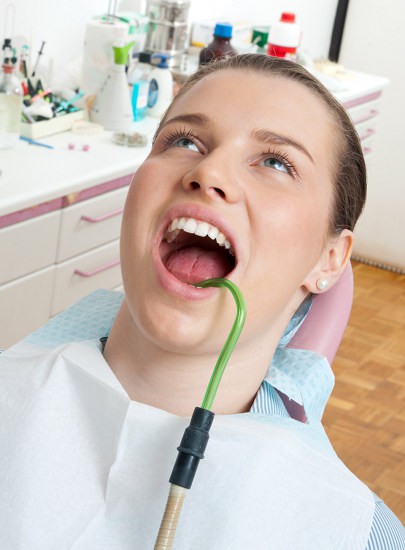 A reader named Jeanny recently emailed me the following questions:
A reader named Jeanny recently emailed me the following questions:
Why is it necessary to suction after local anesthetic?
Why is it necessary to suction when doing a filling?
Can blood be involved in both of the above procedures?
I'll answer the first two questions later on in this article. In response to the last question, blood can be involved when giving anesthetic and doing fillings, but many times it is not.
First, let's talk about the two main types of suctions that dentists routinely use.
The Two Main Types of Dental Suctions
There are two main types of dental suctions that dentists use: the saliva ejector and the high volume suction.
The saliva ejector does exactly what its name implies; it sucks saliva out of the mouth. This is the suction pictured at the upper right of this article. Many times dentists will have the patient close down on this suction so that it can suction away any remaining saliva in the patient's mouth.
The other main type of dental suction that we use is the high volume suction. This suction is so strong that the dental assistant simply holds it close to where the dentist is working and it will suck away any nearby debris, much like a strong vacuum cleaner can suck away crumbs without actually touching them.
You can see the high volume dental suction pictured below - try to pardon the lack of glove use by that dentist!
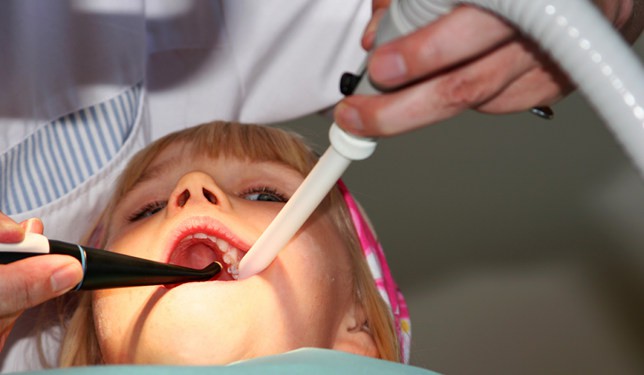
Why Dentists Use a Dental Suction
Now that the introductions are over, let's talk about some of the different reasons why dentists will use a suction.
For Patient Comfort
Keeping the patient comfortable is a high priority. In response to Jeanny's question, we suction after giving anesthetic because the anesthetic has a bitter taste, and most patients prefer to rinse out with water and use the saliva ejector. Also, if the anesthetic sits in the back of your mouth for too long, it may start to slightly numb the back of your mouth and could give the patient a gagging sensation.
We will also use the suction to make sure that you don't get too much water in your mouth while we are working.
To Clean Away Any Excess Dental Materials
When a dental hygienist cleans and polishes your teeth, you can get a lot of cleaning paste in your mouth. We use the suction to help clean all of that away. Also, when dentists are do amalgam fillings, pieces of the soft amalgam can sometimes fall away from the tooth surface. We use the suction to help whisk them away.
To Keep The Tooth Dry
During some procedures, such as white fillings, it is important that the tooth stay clean and dry. The suction helps keep the tooth dry by sucking away any saliva, blood, and water that may have accumulated around the tooth. If the cavity went below the gum-line, then it's pretty likely that the gums will bleed during the filling.
To Help the Dentist See
As I mentioned in a previous article about the dental drill, the drill that dentists use to do fillings sprays out a lot of water to keep the tooth cool and clean. Unfortunately, that water can quickly build up in the mouth and get on the dental mirror. In order to ensure that the dentist can see the tooth while working on it, it's necessary to use the high volume suction to suck away all of that debris.
Those are the four main reasons that I came up with as to why dentists use the dental suction. In conclusion, let's take a look at a question that I asked my dental hygienist as a child.
Where Does The Stuff Go After It's Sucked Away?
I remember sitting in the dental chair in Dr. Arnold's office as a child wondering what happens to all of the stuff that gets sucked down the suction. Maybe I was hoping that the tooth fairy would somehow be able to save the bad part of my baby tooth that the dentist removed and put it back together once my tooth fell out. After gathering up the courage to ask, I think I was slightly disappointed by the answer.
After your saliva, tooth debris, etc. gets sucked away, it travels through the suction line to a vacuum separator that will separate out any solids. After that, your spit makes a journey down the pipes and into the sewer system.
It is now recommended that dentists install amalgam separators in their suction lines to separate out any dental amalgam and keep it from getting into the public sewer systems.
Questions?
Do you have any questions about why dentists use suction? Leave a comment below and I'll try to get back to you. Thanks for reading!
Related posts:
Source: http://feedproxy.google.com/~r/OralAnswers/~3/mAT_akibDxY/
dental implant surgery mouth surgery tooth implant procedure dental news dental implant procedure
Periodontal health influences stem cell transplant success
Periodontal infection can increase the risk for developing bacteremia during the neutropenic phase of allogeneic hematopoietic stem cell transplantation (HSCT), research suggests. Noting that the role of periodontal infection in influencing HSCT outcomes may have been underestimated, Judith Raber-Durlacher (University of Amsterdam, the Netherlands) and team write: “The results of this study point to the importance of an oral evaluation before HSCT as well as interventions before and during HSCT to reduce the microbiological load (eg, by periodontal treatment and meticulous oral hygiene measures) and thereby reducing gingival inflammation. “This may significantly reduce the overall risk for complications, including OVS [oral viridans streptococci] and CONS [coagulase-negative staphylococci] bacteremia.”
dentures dental implants what are dental implants implants dental dental services
Frequent dental X-rays linked to most common brain tumor
oral tooth surgery sedation dentistry crown tooth dental bridge jaw surgery
Richmond Dentist Explains Affordable Dental Care
Source: http://www.richmondsmilecenter.com/blog/2013/01/18/richmond-dentist-affordable-dental-care/
tooth extraction cost orthognathic surgery mini implants tooth replacement dentures implants
Sunday, January 27, 2013
Patient Support Sites for Medical Tourism
Source: http://feedproxy.google.com/~r/BeautyFromAfar/~3/0GaNIJe9ZWw/
tooth implants cost dental extraction dentist implants implants dentist teeth implants cost
Preventing bacteria from falling in with the wrong crowd could help stop gum disease
implants teeth teeth implants implant teeth teeth implant cosmetic dental surgery
New Rules of Marketing, Part 2
Source: http://blogohj.oralhealthjournal.com/clinical/dental-industry-2/new-rules-of-marketing-part-2
dentistry implants cosmetic dentistry tooth implant implant tooth cosmetic dentist
Dentist in San Jose, CA Encourages Patients to Leave Online Reviews
dental bridges implant dentists dental problems tooth extraction cost orthognathic surgery
Lab-made tissue picks up the slack of Petri dishes in cancer research
dental surgeon dental surgeons oral dental surgeon dental oral surgeon facial surgery
1st Annual Halloween Candy Buy-Back Event A Huge Success!!!
dental oral surgery dentalimplants maxillofacial surgery implants teeth teeth implants
Saturday, January 26, 2013
Novel chewing gum formulation helps prevent motion sickness
mouth surgery tooth implant procedure dental news dental implant procedure dental implants surgery
The Battle Of The Sexes – Dental Style
Source: http://www.omfdental.com/blog/2013/battle/?utm_source=rss&utm_medium=rss&utm_campaign=battle
mini implants tooth replacement dentures implants dental extractions implant dentures
Chewing ability linked to reduced dementia risk
tooth extraction implant dentistry dental treatment oral surgeons oral surgeons in
Central Sleep Apnea
Source: http://www.dentalprnews.com/medical_dental_articles/2013/01/central-sleep-apnea-324291.htm
dental implants surgery dental implants procedure tooth implant surgery oral surgery teeth dental surgery cost
Red Lentil Spaghetti – A Makeover Recipe to Warm You Through the Holidays!
Source: http://www.omfdental.com/blog/2012/spaghetti/?utm_source=rss&utm_medium=rss&utm_campaign=spaghetti
tooth implant cost tooth implants cost dental extraction dentist implants implants dentist
Red Lentil Spaghetti – A Makeover Recipe to Warm You Through the Holidays!
Source: http://www.omfdental.com/blog/2012/spaghetti/?utm_source=rss&utm_medium=rss&utm_campaign=spaghetti
oral and maxillofacial surgeon dentistry oral surgery oral surgery dentistry periodontics oral implants
Friday, January 25, 2013
Men with erection problems are three times more likely to have inflamed gums, study finds
oral surgery dentistry periodontics oral implants dental crown oral tooth surgery
Stocking Stuffers That Are Better Than Candy And Sweets
 | The holiday season is upon us again, and the stockings are hung by the chimney with care. Instead of having Santa stuff those stockings with candy and sweets, tell him to bring you something that won’t destroy your beautiful smile (or waistline!).
Here are a few suggestions:
And, of course, ask for a new toothbrush! For the kids, there are plenty of themed toothbrushes that will make brushing fun. Spongebob, Justin Bieber and Dora on toothbrushes will encourage kids to brush longer. A new or more expensive toothpaste than you normally buy will be a nice treat. And don’t forget the dental floss! | ||||||||
implant dental dental implant oral surgeon tooth extraction implant dentistry
Blood from periodontal disease can be used to screen for diabetes
mini implants tooth replacement dentures implants dental extractions implant dentures
Zero Tolerance for Workplace Bullying and Harrasment
dental works denture implants dental bridges implant dentists dental problems
Ancient tooth may provide evidence of early human dentistry
dentistry implants cosmetic dentistry tooth implant implant tooth cosmetic dentist
Thursday, January 24, 2013
Getting Smarter About Dental Implants
Source: http://worldental.org/gums/smarter-dental-implants/9775/
tooth extraction cost orthognathic surgery mini implants tooth replacement dentures implants
Oral bacteria may signal pancreatic cancer risk
oral dental surgery dental oral surgery dentalimplants maxillofacial surgery implants teeth
Short-term intestinal parasite infection triggers specific cytokines that can prevent the development of type 1 diabetes
dental crown oral tooth surgery sedation dentistry crown tooth dental bridge
Experts warn of misbehaving tooth fairy
facial surgery dental oral surgeons maxillofacial surgeon oral maxillofacial surgeon oral and maxillofacial surgeon
Uninsured Kids to Receive Free Dental Care
Source: http://worldental.org/free-dental/uninsured-kids-receive-free-dental-care/9739/
oral surgery dentistry periodontics oral implants dental crown oral tooth surgery
Wednesday, January 23, 2013
Anthropologists discover new research use for dental plaque: Examining diets of ancient peoples
dental surgeon dental surgeons oral dental surgeon dental oral surgeon facial surgery
Dentist in Charlotte, NC Provides Mobile Website for Improved Dental Health Care Access
dentist implants implants dentist teeth implants cost dental works denture implants
Top 10 New Year’s Resolutions for Dentists and Office Managers
dental surgery dental clinic dentures dental implants what are dental implants
Dentist in San Jose, CA Encourages Patients to Leave Online Reviews
dental surgery dental clinic dentures dental implants what are dental implants
1st Annual Halloween Candy Buy-Back Event A Huge Success!!!
dentures dental implants what are dental implants implants dental dental services
Tuesday, January 22, 2013
What your face says about your health
An individual’s face not only gives nonverbal signals about someone’s true well-being from unconscious facial expressions, but the state of their skin reveals a great deal about what’s going on inside, both physically and emotionally. In fact, practitioners of traditional Chinese medicine have used facial analysis as a diagnostic tool for centuries, marrying specific facial areas and features with organs and emotional states.
Source: http://www.dentapress.com/headlines/4897-what-your-face-says-about-your-health.html
maxillofacial surgeon oral maxillofacial surgeon oral and maxillofacial surgeon dentistry oral surgery oral surgery dentistry
Famous people you didn’t know were dentists
Who says dentistry isn’t exciting? Our noble profession has captured the hearts and imaginations of some pretty interesting people over the years. Granted, eventually these folks turned to other less fascinating professions—like acting, gun fighting, inventing, painting and saving the country—but still, they all had their “roots” (pardon the pun) in the enviable art of dentistry. Just check out this list of people you didn’t know were dentists.
Source: http://www.dentapress.com/blogs/4898-famous-people-you-didn%e2%80%99t-know-were-dentists.html
dental oral surgeon facial surgery dental oral surgeons maxillofacial surgeon oral maxillofacial surgeon
Maintaining Oral Hygiene In Emergencies

With hurricane season among us, it is a good time to review some “need to knows” about brushing with compromised resources. Here are suggestions for keeping your mouth healthy when in an emergency situation.
If you have access to a toothbrush and are without water, you can still use it to brush the particles off the teeth. Dry brushing stimulates the salivary glands and will provide some natural digestion for the particles as well.
If you have no toothbrush handy, you can use your clean finger with some toothpaste. Remember to spit it out!
Even in a worse-case-scenario, if all you have is a fluoride mouthwash, use it. It may not remove plaque like brushing does, but it will help kill germs and prevent new plaque from forming.
In an emergency situation, it’s easy to grab sugary comfort foods. Instead of empty calorie candy bars that might contribute to tooth decay, try a granola bar instead. The crunchy granola will provide some friction for plaque removal, and some even have good nutritional value!
Shelters and hotels usually provide dental care items for free. Don’t be afraid to ask for them.
Have a safe and healthy hurricane season
tooth implant procedure dental news dental implant procedure dental implants surgery dental implants procedure
Profit is not a Four-Letter Word
Source: http://blogohj.oralhealthjournal.com/uncategorized/profit-is-not-a-four-letter-word
dentistry implants cosmetic dentistry tooth implant implant tooth cosmetic dentist
The Dawson Academy Introduces New Curriculum on Emerging Health Care Services in Dentistry
dental implants surgery dental implants procedure tooth implant surgery oral surgery teeth dental surgery cost
Brushing teeth: New 'massage method' quadruples protection against tooth decay, study suggests
implant dental dental implant oral surgeon tooth extraction implant dentistry
Monday, January 21, 2013
Craze Lines: Hairline Cracks In Your Front Teeth
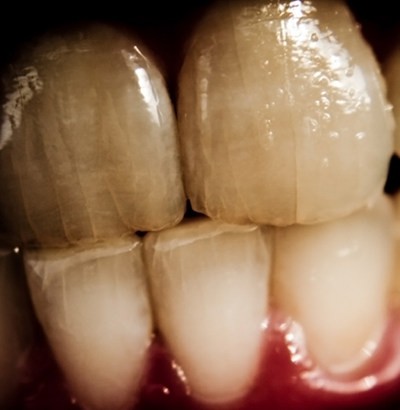 Catherine recently left a comment asking about the discolored lines that she has running vertically in her front teeth. She was curious about what kinds of solutions there are to deal with this cosmetic problem.
Catherine recently left a comment asking about the discolored lines that she has running vertically in her front teeth. She was curious about what kinds of solutions there are to deal with this cosmetic problem.
Before I talk about the solutions to these lines that can occur in our teeth, I'll give an overview of what they are, why they happen, and how to get rid of them.
Craze Lines: Vertical Lines in Our Teeth
These vertical lines in her front teeth are actually known as craze lines. Over years of use, our teeth tend to develop tiny cracks in the hard outer layer known as enamel. These cracks normally don't cause any pain, but can easily stain, causing embarrassing discolored lines on your front teeth.
What Causes Craze Lines?
Craze lines can be caused by stress placed on a tooth. This can happen over the course of a lifetime of chewing or by any other process that causes a lot of stress on our teeth.
Some common causes of craze lines are biting your nails, grinding your teeth (many people do it in their sleep without realizing it), using your teeth as tools, trauma to your teeth, or simply routine use of your teeth.
In Dr. Cohen's textbook about root canals, he states, "Craze lines are merely cracks in the enamel that do not extend into the dentin and either occur naturally or develop after trauma."
This case report describes a situation where craze lines were caused by biting on hard objects such as the top ring of an aluminum soda pop can. Speaking of metal rings, wearing tongue rings can cause craze lines in your teeth.
Interestingly, some research points to temperature changes as a possible cause of craze lines. That's a great incentive to not chew ice cubes (especially after drinking hot coffee!)
One other cause of craze lines that should be discussed is going to the dentist. This research article states that he process of drilling away a cavity and filling a tooth can cause craze lines. That's certainly not a reason to avoid the dentist, though, since craze lines are harmless whereas untreated cavities can lead to significant complications.
Do Craze Lines Mean Your Teeth are Cracked?
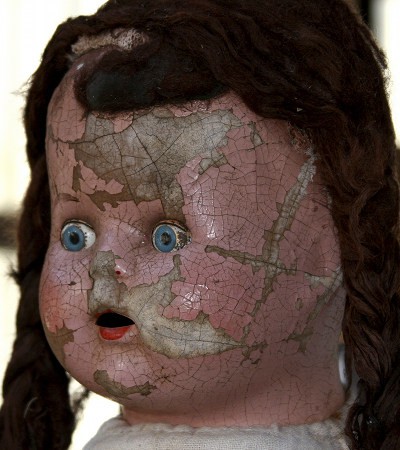
Although craze lines are very tiny cracks in the outermost layer of your tooth, you don't need to worry about your tooth cracking in half.
One good way to think about craze lines is to take a look at the photo of this porcelain doll. The cracks in the porcelain occurred after years of use. Although they are cosmetically displeasing, the cracks don't mean that the doll's head is about to crack open!
If you suffer from craze lines, you'll be pleased to know that the way that our teeth forms makes the enamel highly resistant to cracking.
A recent study looked at the crack resistance of the enamel in our teeth compared to a synthetic enamel. The study concluded, "While enamel is the most highly mineralized tissue of the human body, the microstructural arrangement of the prisms promotes exceptional resistance to crack growth."
If that isn't enough, this study says that "The microstructure of enamel is functionally optimized to guide cracks from the more brittle outer enamel inwards where they experience higher growth resistance and are prevented from causing fracture and chipping."
This study found that enamel is about three times as tough as the naturally-occurring crystals of hydroxyapatite (the crystal that our tooth is made from.)
How to Get Rid of Craze Lines
So, what should you do if you have craze lines and you hate how they look? There are a few alternatives.
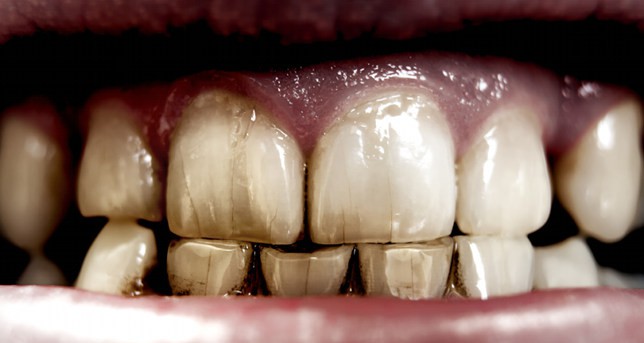
The least invasive option is to try teeth whitening. Many craze lines show up because tiny amounts of debri get into the crack and stain the crack, making it visible. Teeth whitening can bleach away the stain and make the craze lines very hard to detect.
There are other options that involve actual dental work. Before trying these options, it's good to keep in mind that craze lines can be caused by dental work, and that no dental work is better than your natural teeth.
These options include having an aesthetic tooth-colored filling material placed over the crack or having a veneer. To do the filling, your dentist will simply smooth down the tooth in the affected area and add some filling material that is the same color as your natural tooth. To do a veneer, your dentist will smooth down the whole face of the tooth and place a thin piece of porcelain over the tooth (kind of like a fake fingernail.)
Conclusion
With these alternatives in mind, it's worth noting that most dentists agree that there's no need to treat craze lines since they rarely lead to further breakdown of the tooth. Some studies (like this one) do argue that the small lines may serve as a future site of a cavity, but if you're going in for your regular check-ups, your dentist can usually detect potential problems.
Do you have any questions about craze lines or cracks in your teeth? Leave a comment in the comments section below. Thanks for reading!
Image Credits: Top photo © iStockPhoto.com/clintspencer, Porcelain doll photo licensed from Paul Burdett/Shutterstock.com, bottom photo licensed from Piotr Sikora/Shutterstock.comRelated posts:
Source: http://feedproxy.google.com/~r/OralAnswers/~3/ztXE6WVvC_c/
maxillofacial surgery implants teeth teeth implants implant teeth teeth implant